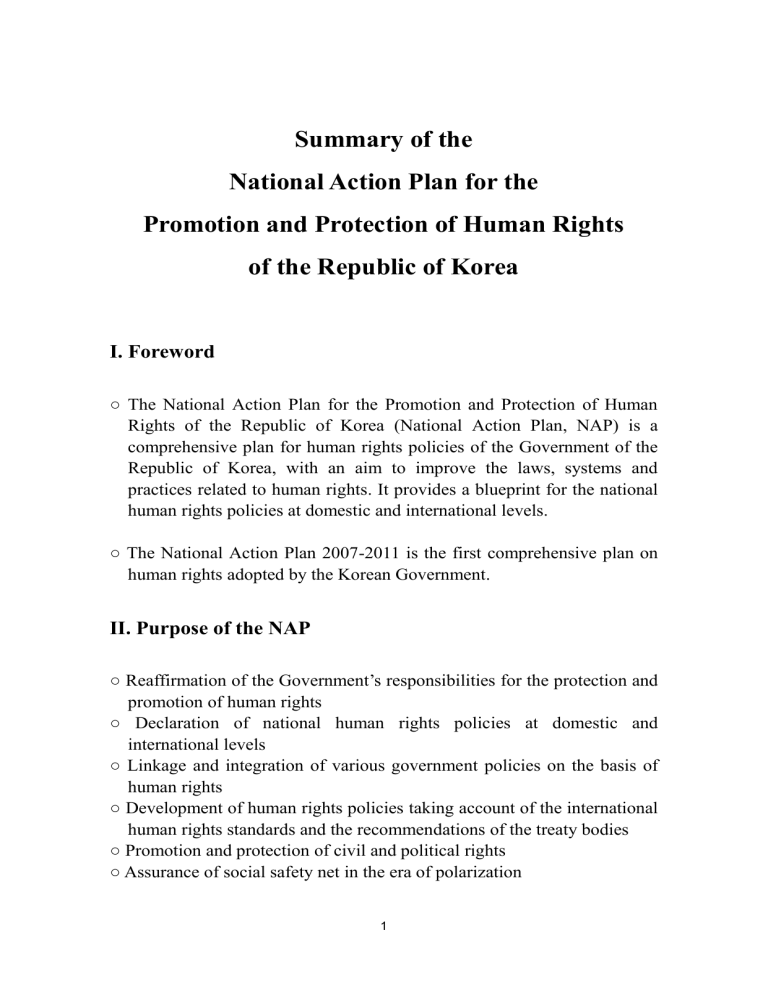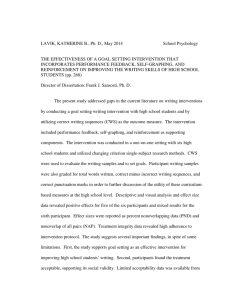Summary of the National Action Plan for the

Summary of the
National Action Plan for the
Promotion and Protection of Human Rights of the Republic of Korea
I. Foreword
○ The National Action Plan for the Promotion and Protection of Human
Rights of the Republic of Korea (National Action Plan, NAP) is a comprehensive plan for human rights policies of the Government of the
Republic of Korea, with an aim to improve the laws, systems and practices related to human rights. It provides a blueprint for the national human rights policies at domestic and international levels.
○ The National Action Plan 2007-2011 is the first comprehensive plan on human rights adopted by the Korean Government.
II. Purpose of the NAP
○ Reaffirmation of the Government’s responsibilities for the protection and promotion of human rights
○ Declaration of national human rights policies at domestic and international levels
○ Linkage and integration of various government policies on the basis of human rights
○ Development of human rights policies taking account of the international human rights standards and the recommendations of the treaty bodies
○ Promotion and protection of civil and political rights
○ Assurance of social safety net in the era of polarization
1
○ Improvements of the overall quality of life
○ Integrating society through the respect for diversity and elimination of discrimination against socially underprivileged and minority groups
○ Heightening public awareness of human rights issues
III. Preparation Process for the NAP
1. Ministerial Meeting
○ Decisions at the ministerial meeting in January 2006
- The Ministry of Justice is responsible for overseeing and collating policies established by relevant ministries
- Decisions on the NAP is made by the National Committee of Policies of
Human Rights
- Finalization of the NAP through public debate and consensus
2. Recommendation by the National Human Rights Commission of
Korea
○ Recommendation on the formulation of the NAP was made in February
2006
3. Consultations among Relevant Ministries
○ Consultations among relevant ministries for the preparation of the NAP from April 2006 to March 2007
4. Public Hearings
○ 4 December 2006 First public hearing for the draft NAP
○ 13 February 2007 Second public hearing for the draft NAP
5. Adoption of the NAP and Report at the Cabinet Meeting
2
○ 30 April 2007 Working-level Committee of Policies of Human
Rights
○ 4 May 2007 National Committee of Policies of Human Rights
○ 10 May 2007
○ 22 May 2007 adopted the NAP
Report to the Vice-Ministerial Meeting
Report to the Cabinet Meeting
IV. Content
1. Composition of the NAP
Chapter 1 : Preface
Chapter 2 : Protection and Promotion of the Civil and Political Rights
Chapter 3 : Protection and Promotion of Economic, Social and Cultural
Rights
Chapter 4 : Human Rights for the Minorities and Socially Vulnerable
Groups
Chapter 5: Human Rights Education, International Cooperation for
Human Rights, and the Implementation of the International
Human Rights Treaties
Chapter 6 : Follow up and evaluation of the NAP
2. Format of Chapters 2 through 5
○ Includes domestic standards, international standards, domestic situation and recommendations of international human rights treaty bodies
○ Presents detailed implementation schemes on the issues
3. Main Issues Included in the NAP a. Reform of the death penalty system (Right to life)
○ Examines current death penalty system in laws and practices and considers the desirability of maintaining the death penalty system or introducing absolute life imprisonment (without the possibility of parole) as the substitute for death penalty
3
b. Reviews of the issues related to conscientious objection to military service and alternative service (Freedom of thought, conscience, and religion)
○ Follow-up measures will be taken based on the results of the reviews conducted by the Research Committee on Alternative Service under the
Ministry of National Defense c. Prevention of the abuse of the National Security Act (Freedom of thought, conscience, and religion)
○ With respect to the crimes that violate the National Security Act, but do not pose direct threat to national security, depending on the cases, measures such as suspension of indictment are taken for flexible and prudent applications d. Implementation of the Scheme on the Protection of Non-regular
Workers (Right to work)
○ The Government is proceeding with its protective schemes for nonregular workers including the application of ‘Act on Protection of Fixedterm Workers’ and ‘Act on Protection of the Dispatched Workers’, comprehensive plans for non-regular workers in the public sector, and protection of special-type workers
V. Implementation of the NAP
○ The National Action Plan will be implemented from the time of the promulgation to 2011 through the cooperation of relevant government ministries
○ Each ministry will submit an yearly report to the National Committee of
Policies of Human Rights on the implementation outcome of the NAP, and the National Committee will release those reports to the public
○ The National Committee will fully evaluate the implementation of the
NAP and will reflect the results on the next NAP
4
Reference
Contents of Chapter 2 : Promotion and Protection of Civil and Political
Rights
Right to life : Death penalty system, suicide prevention projects, etc.
Personal freedom : Arrest system reform, promotion of criminal procedural rights, improvement on the treatment of detainees, inspections of protection facilities for foreigners, human rights of patients within mental health facilities, etc.
Freedom of movement and residence : Promotion of mobility rights for the disabled, enhancement of the ‘Immigration Act’, etc.
Right to privacy : Protection of privacy from surveillance equipment, protection of privacy/reputation from communication networks, restricted use of the resident registration number, enactment of the ‘Act on the Protection of Personal Information’, etc.
Freedom of thought, conscience and religion : Reviews related to conscientious objection to military service, prevention of abuse of the National Security Act, etc.
Freedom of speech, publication, assembly and association : Extended provision of information, expansion of subtitled broadcasting services, better access to the internet, rational application of the ‘Act on Assembly and Demonstration’, etc.
Right to vote : Provision of facilities for disabled voters, system for overseas absentee voting, guarantee of career opportunities in civil service for women, disabled persons, etc.
Right to remedy for the damage of one’s rights and interest : Consolidation of independence and fairness of the military court, system building for human rights protection within the military, etc.
5
Contents of Chapter 3 : Promotion and Protection of Economic, Social, and Cultural Rights
Right to Education : Reinforcement of basic education, financial assistance for school meals, guarantee of education for the disabled, etc.
Right to work : Schemes for the protection of non-regular workers, protection of domestic workers’ rights, employment assistance for the disabled, extended application of the Labor Standard Act, consolidation of the rights to health and safety, etc.
Three basic rights of the workers: Guarantee of the three basic rights of non-regular workers, guarantee of the university teaching staff’s rights to organize, permission for multiple unions at enterprise level, etc.
Right to economic activities : Startup assistance for the disabled, less restrictions on changing workplaces for the migrant workers, introduction of consumer group lawsuits, etc.
Right to adequate standard of living : Improvement of the National Basic Livelihood
System, extended application of the Industrial Accident Insurance Compensation Act, expansion of unemployment benefit, postponement on the suspension of power supply and supply of minimum power, expansion of water supply in the less developed regions, guarantee of food safety, and supply of lease housing, etc.
Rights to health, welfare and environment : Expansion of medical payment for lowincome class, assistance for the infant healthcare management, reinforcement of medical security for the elderly, financial support for the medical payment for patients with rare and incurable diseases, improvement of atmospheric and marine environments, etc.
Rights to culture and art : System building for local cultural development, expansion of opportunities for cultural enjoyments, etc.
Right to family life : Strengthening maternity protection system, family care policy, expansion of the state-operated/public childcare facilities, childcare support for one parent households, assistance for domestic adoption, etc.
6
Contents of Chapter 4 : Human Rights for the Minorities and Socially
Vulnerable Groups
Women : Prevention of sex trade and victim protection, prevention of domestic and sexual violence, victim protection, etc.
Children and youth : Expansion of youth participation bodies, prevention of child abuse, protection of neglected children, consolidation of support system building for youth integration in the local communities, etc.
The disabled : Improvements of legislations and systems relating to the Disability
Discrimination Act, increase in the amount of the disability allowance and the disabled child support, rehabilitation-oriented medical security system for the disabled, personal assistant system for the severely disabled, etc.
The elderly : System for long-term medical treatment, assistance for housing renovation for the elderly households, human rights protection of the elderly within welfare facilities, etc.
Crime victims : Remedial schemes, human rights protection of the crime victims in the criminal procedure, protection of privacy, personal protection, etc.
Foreigners : Implementation of the ‘Basic Act on the Treatment of Foreign Residents in
Korea’, language assistance, support for counseling, culture and social integration, etc.
Overseas Koreans : New visa regulations regarding travel and work for ethnic Koreans living in China and the former Soviet Union, etc.
Refugees : Assistance and protection of rights and interest of the applicants for refugee status and those who have been granted with the refugee status, fairness in the refugee status review procedure, etc.
North Korean defectors : Assistance for employment and settlement, strengthening adjustment abilities of the North Korean youth defectors in schools, etc.
People with medical conditions and the sexual minority : Revision of the ‘Prevention
7
of the Acquired Immuned Deficiency Syndrome Act’, guarantee of human rights for people with Hansen’s Disease, etc.
Contents of Chapter 5 : Human Rights Education, International
Cooperation for Human Rights and the Implementation of the
International Human Rights Treaties
Human rights education : General human rights education, human rights education in schools, human rights education for public officials and workers in the human rights sector, socially vulnerable and minority groups, enterprises and media professionals, promotion of human rights education for the general public, etc.
Domestic and international cooperation for human rights :
Civil participation, support for private organizations, participation in international conferences concerning human rights, Official Development Assistance (ODA), humanitarian projects on North Korea, efforts for the improvement of North Korean human rights, etc.
Implementation of the international human rights treaties : Additional accessions, ratifications and withdrawals of reservations for international human rights treaties, etc.
8



